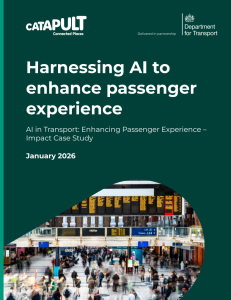Harnessing AI to enhance passenger experience
File type: pdf
File size: 27.5Mb


Harnessing AI to enhance passenger experience
File type: pdf
File size: 27.5Mb
The competition, a collaboration between the Department for Transport (DfT) and Connected Places Catapult, aimed to find innovative ideas that embed responsible AI into a resilient transport system, in alignment with the UK government’s vision.
Despite the UK’s strong AI research base, early-stage innovators often face significant hurdles in scaling their solutions. They struggle to gain the necessary visibility, secure adequate funding, and form key partnerships.
Connected Places Catapult, with funding from the DfT, launched the “AI in Transport Enhancing Passenger Experience” competition in December 2024 to explore the breadth of early-stage innovative ideas (TRL 2-6) that embed responsible AI into a resilient transport system, in line with the government’s vision.
Explore the impact from the key participants in the case study below.

Harnessing AI to enhance passenger experience
File type: pdf
File size: 27.5Mb

We are hosting a Digital Twin Hub session on Day 1, 22 April at 2pm, titled ‘Digital twins driving innovation in the North – Explore innovative projects that look to catapult the North of the UK into a bright digital future’. Join Nury Moreira, Community Manager of Digital Twin Hub, and other speakers for an inspiring conversation.

This year, we are proud to host our own Pavilion, a place designed to showcase real innovation, and provide opportunities to connect with thought leaders, and UK and global peers.
To review our full Agenda of sessions and activities taking place over the three days and plan your visit, please head to the UKREiiF website > Programme tab > Download Programme or > Click on the Connected Places Catapult Pavilion dot to browse online.
Make sure to visit our Pavilion in Pavilion Square, we look forward to connecting with you in Leeds!

We’re delighted to participate in the Open & Agile Smart Cities Conference. Make sure to visit our Connected Places Catapult stand on the show floor and to join the sessions our experts are participating in over the course of the two days.

Visit the UK Pavilion Powered by Connected Places Catapult in Hall P1, stand 61, to discover exciting technological innovation from partners from across the UK.
Sam Markey, our Ecosystem Director, Place Leadership, will co-host an insight-rich event on innovation-friendly procurement with pioneering place leaders from across the world, on the UK Pavilion on Tuesday, 7 November, from 14:00.
On Wednesday, 8 November, our Principal Place Development Leader, Catherine Hadfield, will Chair a session on the role of Innovation Districts in the digital future of cities and regions, from noon.

There is a number of panels that we will be part of.
On Tuesday 15 November at 12.00, Andrew Cockburn, our Head of Global Business Growth will join the UK Smart Mobility Panel where he will give an overview of our work on accelerating innovation of mobility. Andrew will join another panel on that day, at 14:30 he will talk on the Cyber Security and Cyber Resilience for Secure Connected Place panel. During this session Andrew will share some insights on how we can use the existing cyber security model policy work the Catapult has created with the G20 Smart City alliance to promote improved policies globally, and to accelerate the take up in pilot cities.
Join us on Wednesday 16 November at 9:15am to hear more on Smarter Ports as the Driving Force of Regional Innovation, the panel we have created. This discussion panel will be examining the multi-modal element that ports play in the ecosystem, and the opportunity they present for driving a whole system’s approach. Hear from our partners and exciting speakers such as: Tom White, Ecosystem Director for Maritime and Ports at Connected Places Catapult
Nolan Gray, Director at Teesside
Chris Shirling-Rooke, Chief Executive Officer at Mersey Maritime
Don’t miss out this important event, book your ticket to meet with us and to hear more.


This article features in the first edition of the Connected Places Magazine
It’s a story that begins and ends with cities as the engines of national growth. According to the World Bank, more than 80% of global GDP is generated in cities. By halfway through this century, three out of four of us will live in cities.
Cities are not just our past, they’re also our future. But we don’t always recognise that.
We know, for example, that cities drive economic and social change thanks to their concentration of people, academic institutions, and access to new technologies and ideas. But traditionally when we think of bilateral innovation and R&D partnerships, we tend to think at the national level.
For instance, countries will agree to cooperate. Missions are held between capital cities, and perhaps a handful of smaller cities are included where possible. That centralised model is now changing. Governments and cities around the world are recognising that economies and place are closely intertwined, and you can’t grow an economy without strong local leadership.
This is why the Catapult has been supporting the governments of the UK and South Korea in breathing life back into the idea of city twinning. It’s doing so using new data models and insights into the unique personality of a city’s innovation economy. And rather like a dating app, it can help match cities anywhere in the world that have complementary governance systems, business climates, and innovation markets.
The UK and South Korea are highly developed, innovation-based economies. The UK is the fifth largest economy in the world, and the third top destination when it comes to private technology investment. Similarly, South Korea is an urbanised, tech-enabled society with a highly skilled workforce. It was ranked by the Bloomberg Innovation Index in 2021 as the most innovative country in the world. This is nothing short of staggering for a former agricultural economy that emerged from civil war in the 1950s.
Both countries also have a strong policy focus on innovation-led growth that creates opportunities across and between regions. For the UK this speaks directly to the Government’s commitment to ensuring the innovation economy is playing its part in levelling up growth right across the country.
The adoption of smart and resilient technologies in cities is also a shared aim for Britain and South Korea. So too is creating new markets for smart city solutions, regeneration projects and urban testbeds. This is why the Catapult is fostering city-to-city relationships. It’s providing UK and South Korean companies new opportunities to collaborate and to remove barriers to market access for small businesses seeking to gain a foothold in their partner cities.
But the unique ingredient is the new intelligence this approach offers. It’s now possible to analyse which British and South Korean cities would twin best with each other.
This is based on a rigorous understanding of:
Because long before the post-war town twinning movement, cities had been trading, exchanging and learning from each other for millennia. Our global economy began with the networks that connect cities. In fact, many of our cities pre-date the nation states in which they are located.
London is certainly older than the UK, or even England. Athens and Rome speak for themselves, and on the Han River near present-day Seoul, a city was first recorded over 2,000 years ago.
Yet Sejong only emerged on the map as a new planned city in 2007.
So perhaps the renaissance of city twinning we’re seeing between the UK and South Korea is as new as it is old – an embrace of the digitally-driven global innovation economy on the one hand, and a rediscovery of a deeper history of urban collaboration on the other.
According to the World Bank, more than 80% of global GDP is generated in cities. By halfway through this century, three out of four of us will live in cities as the world population moves towards 10 billion.

The World Cities Summit (WCS) is an international conference series on public governance and the sustainable development of cities. This is an opportunity for government leaders and industry experts to address liveable and sustainable city challenges, share integrated urban solutions and forge new partnerships.
Connected Places Catapult is pleased to become a strategic partner of the World Cities Summit which is being hosted by our partner the Centre for Liveable Cities.
Join us in person to hear from Nicola Yates OBE, our Chief Executive Officer who will give an overview of the global urban city sustainability landscape at the Tomorrow’s Sustainable Cities Today event. The discussion panel will be run by our partner Mastercard City Possible on Tuesday, 2 August, 14:00-15:00.
Also, Prof Greg Clark CBE FAcSS, Chair of Connected Places Catapult and 3Ci (Cities Commission for Climate Investment) will run the Sunday Mayor’s Forum and the Green Finance Track of the main Summit.
To book a meeting with us contact Elena Williams from our Global Team at elena.williams@cp.catapult.org.uk



Get the latest insights from innovators and thought leaders in cities and transport!
This first issue of Connected Places magazine is packed with ideas from the people shaping and connecting the places of tomorrow.
There’s an interview with IT industry veteran Dr. Alison Vincent on how ‘connected intelligence’ is shaping the places of tomorrow, and a look at the future of our maritime economy from the Catapult’s very own Tom White.
We’ve got innovation news, advice on applying academic innovation, and recommendations for places to visit, books to read and podcasts to listen to if you – like us – have an insatiable appetite for new ideas.
Discover the people and companies at the forefront of new ideas for our connected world.

Love this? Then you’ll also love the Connected Places Podcast!

